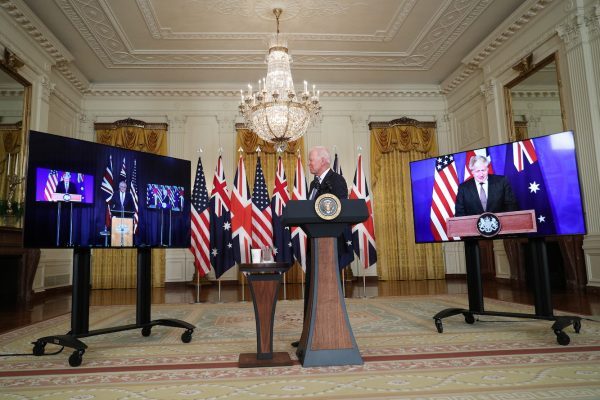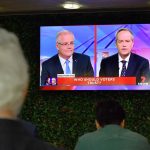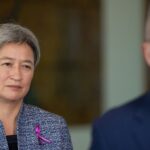AUKUS and Australia’s relations in the Pacific

The announcement of the AUKUS trilateral security partnership with the United States and the United Kingdom on 16 September 2021 suggests that Australia has chosen its friends. Australian Prime Minister Scott Morrison described it as a ‘forever partnership for a new time between the oldest and most trusted of friends’. The question is where Australia’s Pacific family sits relative to AUKUS.
The announcement caught many of Australia’s partners by surprise. No Pacific or Southeast Asian leaders were consulted. New Zealand Prime Minister Jacinda Ardern was informed, but only after the decision. Morrison has included certain prime ministers, including those of Fiji and Papua New Guinea, in his subsequent outreach, but other Pacific leaders feel ‘sidelined’.
Canberra is aware that AUKUS has generated anxiety in the Pacific islands. The Secretary of Australia’s Department of Defence, Greg Moriarty, acknowledged that the government has ‘done a lot of thinking about outreach into the Pacific’. He added that the government would be ‘talking to all members of the Pacific Islands Forum and the Forum Secretariat’ to convey that the ‘growth of Australian capabilities [will contribute] to regional stability’.
The only Pacific leader to publicly welcome the news has been Federated States of Micronesia (FSM) President David Panuelo (firmly part of the US defence umbrella). He noted that AUKUS ‘does not represent a seismic shift — or any shift at all — from previous commitments or engagements’ and will make the ‘FSM, the Pacific, and really the whole of the Indo-Pacific region safer’.
Papua New Guinea’s Prime Minister James Marape was more circumspect. He commented that ‘we have a very peaceful part of planet earth, we want to protect that peace and serenity … as far as securing peace is concerned, we’ve got no problem, but if such activities bring disharmony in the region then we have an issue’.
Vanuatu’s opposition leader, Ralph Regenvanu, has expressed his disappointment and fear for the Pacific’s future. James Bhagwan, general secretary of the Pacific Conference of Churches, is concerned that AUKUS ‘is not Australia acting in the best interests of the rest of its Pacific Vuvale’ (family).
Although not explicitly commenting on AUKUS, Fijian Prime Minister Frank Bainimarama observed at the 76th session of the United Nations General Assembly that ‘If we can spend trillions on missiles, drones and nuclear submarines, we can fund climate action’.
Solomon Islands Prime Minister Manesseh Sogavare similarly stated that ‘we do not support any form of militarisation in our region that could threaten regional and international peace and stability’.
These perspectives are no surprise. Pacific leaders have regularly expressed concern about being dragged into strategic competition or being forced to make a ‘choice’ between China and traditional partners, including the AUKUS members.
Instead, Pacific leaders have identified that climate change is the single greatest threat to the livelihoods, security and wellbeing of the peoples of the Pacific. As Samoan Prime Minister Fiame Naomi Mata’afa recently said, ‘this is not new to him [Morrison]’.
The lack of preparatory diplomacy in the Pacific is particularly conspicuous given the flagship component of the agreement: Australia’s development of nuclear-powered submarines. Pacific peoples have experienced the catastrophic human and environmental consequences of nuclear weapons.
As Kiribati President Taneti Maamau told the ABC, ‘Our people were victims of nuclear testing, we still have trauma. With that in mind, with anything to do with nuclear, we thought it would be a courtesy to raise it, to discuss it with your neighbours’.
The region has a long history of advocacy for a nuclear-free Pacific. As recently as the 2019 Pacific Islands Forum, leaders expressed concern about the potential threat of nuclear contamination and called for operationalising the Treaty of Rarotonga. In the past year, Pacific states have challenged Japan’s plans to release nuclear waste into the Pacific Ocean and played a key role in bringing the Treaty on the Prohibition of Nuclear Weapons into international law.
Morrison has stressed that AUKUS will comply with Australia’s international and regional commitments. But the non-proliferation community argues that the loophole exempting naval reactors from nuclear safeguards is a major threat to limiting the production and use of the highly enriched uranium required to make nuclear weapons.
AUKUS highlights how Australia has long struggled to maintain a coherent discourse that balances its perceived interests with those of Pacific states. It will amplify doubts about the sincerity of Australia’s ‘Pacific family’ narrative arising from Australia’s inaction on climate change.
AUKUS also makes explicit Australia’s identification with the ‘Anglosphere’, echoing a longstanding belief that the Pacific should be managed as an ‘Anglo-Saxon lake’ (as General Douglas MacArthur once put it). This is unlikely to sit comfortably with Pacific states.
In an era where Pacific island states are exercising their agency more assertively and drawing on a wider range of partners, Australia might help assuage concerns by including them in dialogues about security issues affecting their region, and in particular by explaining what AUKUS means for them.
Australia also needs to demonstrate how AUKUS tangibly benefits the Pacific beyond umbrella security assurances. For example, will AUKUS offer additional capabilities in areas of importance to the Pacific, such as oceans governance, illegal fishing and cybercrime? The answers to these questions are far from clear.
This article was written by Soli Middleby, a PhD candidate in the Department of Politics and International Relations at the University of Adelaide and a former Australian diplomat to the Pacific; Anna Powles, a Senior Lecturer in the Centre for Defence and Security Studies at Massey University; and Joanne Wallis, Professor of International Security in the Department of Politics and International Relations at the University of Adelaide. This article was published by The East Asia Forum.
Joanne Wallis is a senior lecturer at the Strategic and Defence Studies Centre at the Australian National University and the author of Pacific power? Australia’s strategy in the Pacific Islands.













